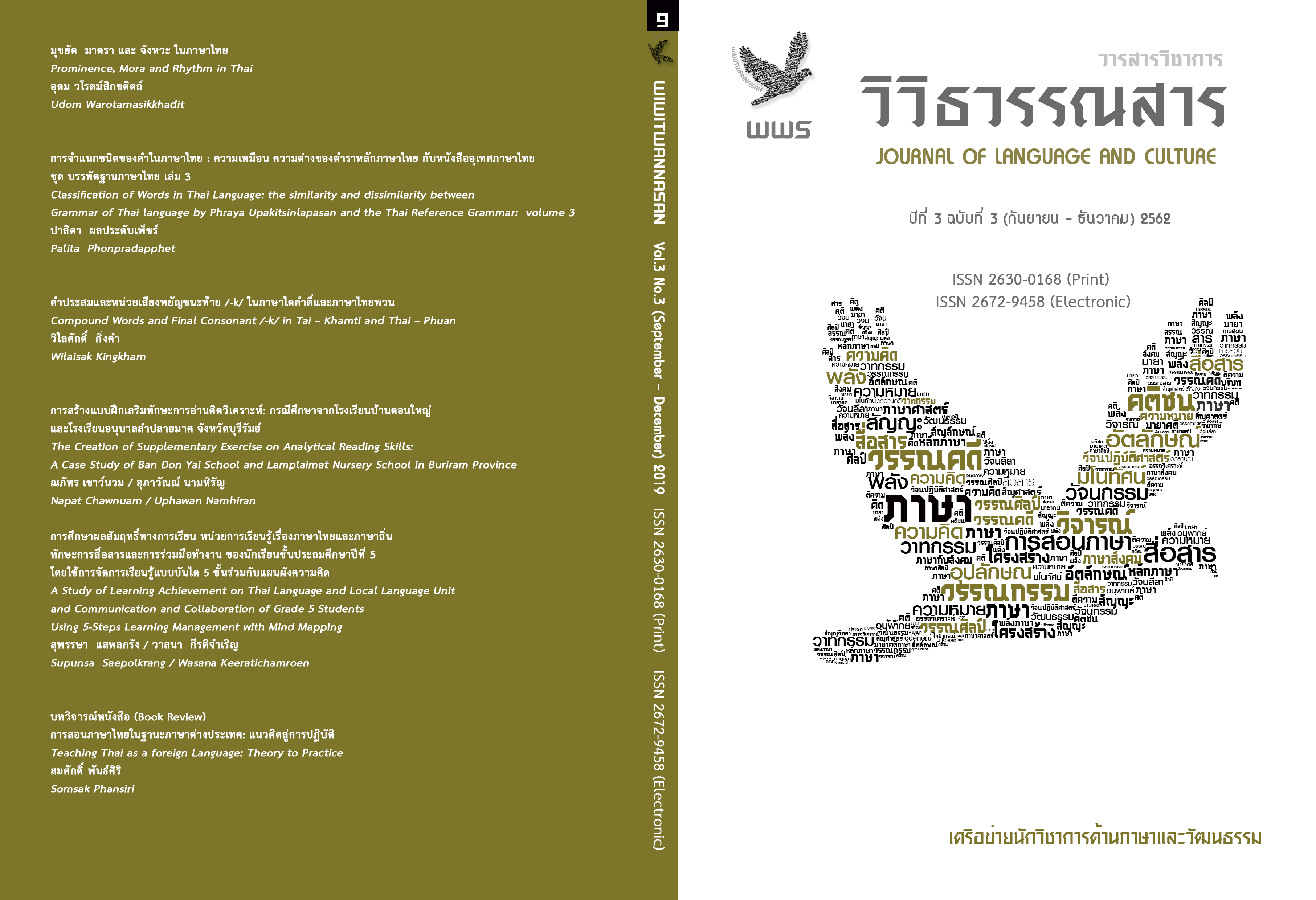Classification of words in Thai language : Similarities and Dissimilarity between the traditional textbook and the new textbook
Main Article Content
Abstract
This article presented a comparative study of classification of words in Thai language between the traditional textbook; Grammar of Thai language by Phraya Upakitsinlapasan and the modern textbook; the Thai Reference Grammar: volume 3, Thai Standard Grammar . It was found that both texts possessed of different concepts of different word classification, namely 1) the issue of collective nouns that were absent in the new textbook, 2) the issue of minor difference of distributive pronouns in two books, 3) the issue of whether or not the pronouns should be classified in the pronoun category, 4) the issue of whether or not the clausal verb verbs classified as verbs or nouns, 5) the issues of difference of adjectives and adverbs, 6) the issues of new type of verbs which were absent in traditional textbook, 7) the issue of whether or not helping verb should be considered a verb, 8) the issues of various functions and definitions of adverbs in the old texts, 9) the issues of similarities and dissimilarity of prepositions according to the old text and the new text, 10) the issues of the difference of conjunctions, 11) the issue of whether or not certain words should be considered as exclamations.
Article Details
Copyright is that of the journal any reproduction must be permitted by the editor of journal
References
Bandhumedha, N. (2015). Waiyakonthai (In Thai) [ Thai Grammar] (7th ed.). Bangkok: Project of Research Publication of the Faculty of Arts, Chulalongkorn University.
Chinloet, N. (2006). Kan chamnaek muat kham nai tamra lak waiyakon thai : lak withikhit lai thruesadi. (In Thai) [Part of Speech in Textbooks of Thai Grammar: Varity of Concepts and Theories]. VANNAVIDAS, 6(1), 189-216
Diphadung, S. (2000). Sathanaphap kan wichai thang phasasat nai prathet thai : rabop nuai kham thueng rabop prayok lae khwammai (In Thai) [A Trend of research in linguistics in Thailand: system of word, sentence and meanining. Journal of Language and Culture, 19 (2), 42-77.
Mekphaibun, S. (Trans.). (2019). Kan klap ma khong chaochai (num ) noi (In Thai) [The Return of the Young Prince ].(2nd ed.). Bangkok: Phapkanphim.
Phonpradapphet, P. (2018). Lak phasa thai chut (in Thai) [Principles of Thai Language] Buri Ram: Winai
Printing House 2509.
Panupong, W. et. al. (1989). Khrongsang phasa thai : rabop waiyakon (in Thai) [ A Structure of Thai Language: Grammatical System]. (10th ed.). Bangkok: Ramakhamhaeng University Press.
Panupong, W. et al. (2012). Nangsue uthet phasa thai : chut banthatthan phasa thai lem 3 : chanit khong kham wali prayok (In Thai) [ Thai Reference Book: Standard Thai Language Volume 3: Type of Word, Phrase, Sentence. (2nd ed.) Bangkok: Thai Language Institute, Bureau of Academic Affairs and Educational Standards Office of the Basic Education Commission, Ministry of Education.
Prasitratsint, A (2000). Chanit khong kham nai phasa thai : kan wikhro thang wakkayasamphan doi asai thankhomun thang phasa thai patchuban song lan kham (in Thai) [ Part of Speech in Thai: A Syntactic Analysis Based on a Two-milion-word corpus of Current Thai] Bangkok: The Thailand Research Fund.
Phraya Upakitsinlapasan. (1981). Lak phasa thai ( akkharawithi wachi wiphak wakkayasamphan chanthalak) (In Thai) [Principles of Thai Language: Phonology, Morphology, Syntax, and Prosody.] Bangkok: Thaiwatthanaphanit.
Thonglo, K. (2013). Lak phasa thai (In Thai) [Principles of Thai Language]. (54th ed.). Bangkok: Ruamsan. Warotamasikkhadit, U. (2535). Phasasat bueangton (in Thai) [Introduction to Linguistics]. (4th ed.). Bangkok: Ramkhamhaeng University Press.


